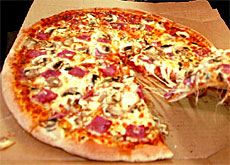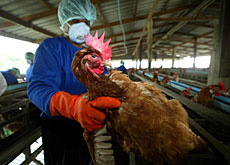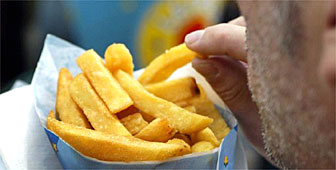Customs search for products with banned dye

Swiss customs agents have been checking for British food products containing a banned synthetic dye known as Sudan 1.
The Federal Health Office said on Monday that only one of the 359 products included in the biggest recall in British history had made its way to Switzerland.
Last week London forwarded the Swiss a list of items that could contain Sudan 1, a dye which has been linked to an increased risk of cancer and which has been banned as a food additive in the European Union since 1995. It is also no longer authorised in Switzerland.
The British Food Standards Agency (FSA) ordered the recall of these products on Friday.
Premier Foods, an Essex-based food company, triggered a nationwide alert after an Italian customer found the dye in Cross & Blackwell Worcester sauce on February 2.
Biggest recall
The recall was decided last week after the illegal dye was detected in foodstuffs in supermarkets, shops and restaurants across Britain.
According to British media reports, the FSA said it only became fully aware of the scale of the problem when Premier Foods supplied its list of customers on February 14.
Many of the products concerned are ready-made meals such as shepherd’s pie, pasta bake, chicken wings, sausage casserole, pizza and chilli con carne. A number of them are sold under the brand names of supermarket chains, such as Tesco, Sainsbury’s, Marks & Spencer, Asda and Waitrose.
Other brands affected by the recall are Heinz, McDonald’s, Pizza Hut and Unilever.
Like the EU, Switzerland has banned the use of Sudan 1 as a food additive.
The country’s biggest distributors – Migros, Coop and Denner – said on Monday that none of the products they stocked were affected by the dye.
No special measures
A spokesman for the Federal Health Office said that cantonal laboratories carried out regular checks, and that the last time Sudan 1 was detected was six months ago.
One brand of tomato sauce was pulled off the shelves at the time.
No other special measures have been ordered despite the British alert.
The dye was contained in a batch of five tons of red chilli powder delivered to Premier Foods in 2002 after passing through the hands of at least two suppliers in Britain.
The powder was used to produce Worcester sauce, which was in turn used as an ingredient in other food products.
Since July 2003, cargoes of dried and crushed or ground chilli and curry powders coming into any EU country have to be accompanied by a certificate showing they have been tested and found to be free of Sudan 1.
Any consignment that does not include this certification must be detained for sampling and analysis.
Switzerland’s last major food scare was in 2002, when tests showed that chicken products from China contained high levels of antibiotics, prompting a ban on imports.
The Swiss also banned imports of poultry and related products from Thailand and China last year following an outbreak of bird flu in southeast Asia.
swissinfo with agencies
Sudan 1 is a synthetic red dye normally used for colouring solvents, oils, waxes, petrol and shoe and floor polishes.
It is rated a “class three” carcinogen, and has been banned from use as a food additive in the European Union since 1995.
Laboratory tests have shown it to cause cancerous liver tumours in mice, rats and rabbits.
Sudan 1 is used to colour some chilli powders produced in India and exported around the world.

In compliance with the JTI standards
More: SWI swissinfo.ch certified by the Journalism Trust Initiative



You can find an overview of ongoing debates with our journalists here . Please join us!
If you want to start a conversation about a topic raised in this article or want to report factual errors, email us at english@swissinfo.ch.